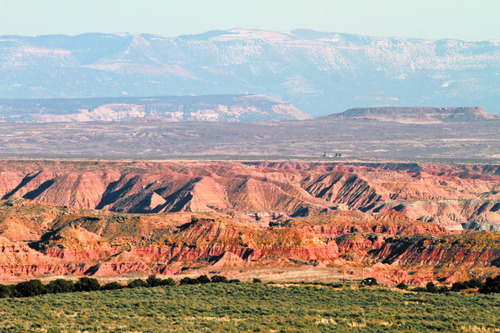This is an archived article that was published on sltrib.com in 2012, and information in the article may be outdated. It is provided only for personal research purposes and may not be reprinted.
An administrative law judge has affirmed Utah's decision to OK a Book Cliffs tar sands mine without requiring a groundwater pollution permit.
The decision nearly concludes the state's permitting for the nation's first fuel-producing tar sands mine, leaving two state boards who were waiting on the judge's recommendation to sign off. It likely sets up an environmental appeal to the Utah Court of Appeals, though.
"I'm pleased with the findings," Walt Baker, Utah Division of Water Quality director, said in a written statement Wednesday. "It acknowledges DWQ staff did a thorough review of the project and appropriately determined it would have negligible impact to the groundwater."
Judge Sandra Allen's decision hinged on whether there was groundwater around PR Spring in the arid high country between Vernal and Moab. If so, the state might require a pollution permit for any chemicals that might leach into it and ultimately reach the Colorado River. The company, Alberta-based U.S. Oil Sands, argued that there was no saturated groundwater — just intermittent precipitation and a deep regional aquifer that would be unaffected—and therefore no need for a permit.
"We are disappointed, obviously, but this is not the end of the road," said Rob Dubuc, a Western Resource Advocates attorney representing Moab-based Living Rivers in seeking to block the mine. "It's likely that we're going to appeal this decision."
The company acknowledged there were seeps and springs in the area, Dubuc said, and Living Rivers contended there was inadequate evidence for a lack of groundwater.
US Oil Sands CEO Cameron Todd said the decision is welcome, though his company's citrus-based solvent would strip oil from the sands without polluting anyway.
"I'm more interested in the fact that we have a benign process that uses no toxic chemicals that would produce leachate, and [it] would not affect the environment with or without groundwater," Todd said. "It's got the best environmental footprint of any project in our industry."
Backed by a University of Utah geoscientist, Living Rivers argued that the solvent would release cancer-causing petrochemicals by making the natural tars more mobile. US Oil Sands disputed that.
The mine, on a Utah School & Institutional Trust Lands Administration lease, would produce up to 2,000 barrels of oil a day — small by the standards of a Canadian industry that strips oil from mined sands with water rather than chemicals. The Utah sands have properties making the fuel more difficult to extract.
The company hopes to produce oil by the fourth quarter of 2013, Todd said. First, though, it must raise more money to set up the mine.



